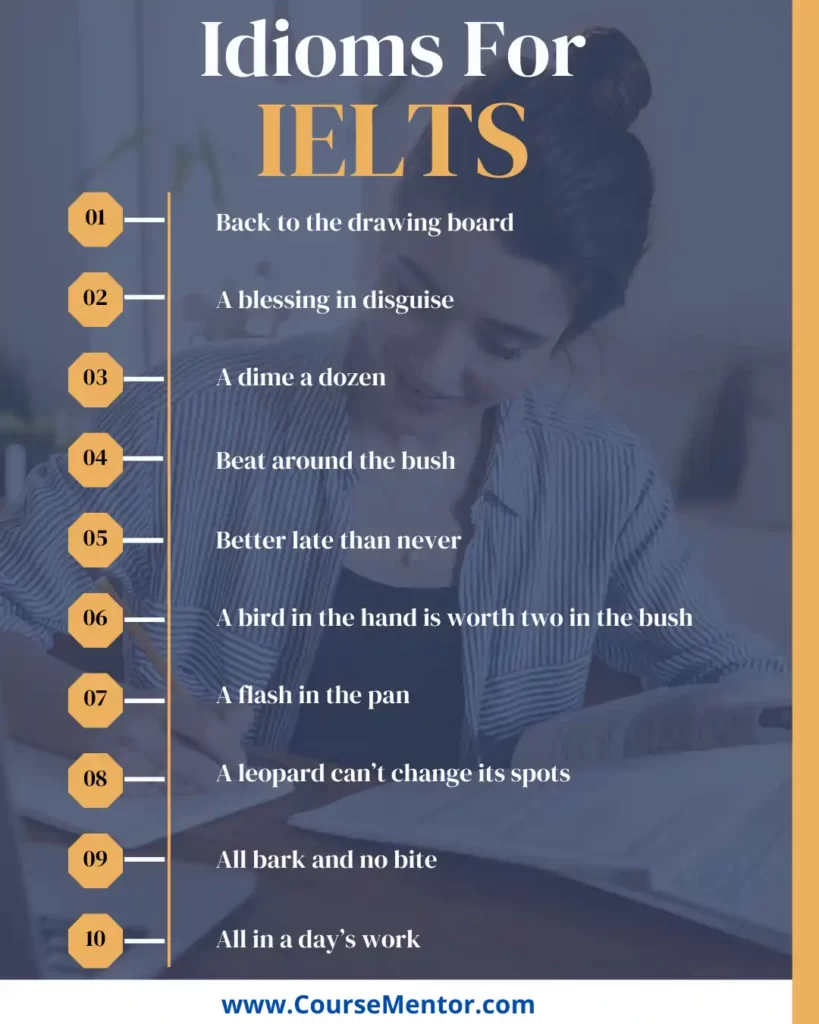Idioms are important to make your speech and writing more interesting and naturalistic. They are very useful in English language tests.
If you have a good knowledge of idioms, scoring high in English language exams will be easy. Getting a high score on the English language exam is very important to secure your place in top universities abroad.
So, to help you secure your place in the top universities and to get a good score in English language exams, I will provide you with the most common advanced-level idioms with examples and meanings.
So let’s start learning some most common and useful idioms along with their meaning and examples.
Most Common Advanced-Level Idioms With Examples
Here, I will list some of the most common and useful advanced-level idioms with examples and meaning that you can use.

- Back to the drawing board
Meaning – To start from a new end for any idea or project.
Example – When my last experiment blew up, I had to go back to the drawing board.
- A blessing in disguise
Meaning – A good thing that looks bad in starting.
Example – Losing my previous job was a blessing in disguise in starting, but I got better opportunities later.
- A dime a dozen
Meaning – Something that is very common
Example – Due to Covid 19, working from home has become a dime a dozen.
- Beat around the bush.
Meaning – Not saying something because you are uncomfortable saying that.
Example – If you have any query, you can directly ask me do not beat around the bush.
- Better late than never
Meaning – Better to be late than not to show up at all.
Example – You will face many difficulties when doing a startup, but it is better late than never, so just go for it and fulfill your dreams.
- A bird in the hand is worth two in the bush.
Meaning – It is good to hold on to what you have rather than losing it by going after something that you are not sure about.
Example – I once thought of quitting my job and starting a new business to earn more, but my friends warned me, saying, “you have to remember that a bird in the hand is worth two in the bush.”
- A flash in the pan
Meaning – Something that looks good in starting but fails to meet expectations.
Example – The new restaurant in our town’s heart was a flash in the pan and closed down after only a few months.
Keep reading for more idioms with examples and meaning.
- A leopard can’t change its spots
Meaning – Someone who has a bad habit that is unlikely to change.
Example – It will be hard for Rohan to stop lying, as everyone knows that a leopard can’t change its spots.
- All bark and no bite
Meaning – Someone who tries to show he is tough but does not take any action toward his or her threats.
Example – Our boss told us that he will fire all employees if they do not complete the work before the deadline, which was impossible, but later we learned that it was all bark and no bite.
- All ears
Meaning – Listening carefully with full interest.
Example – Tell me more about your foreign trip, I’m all ears.
- All in a day’s work
Meaning – Doing something that is a routine.
Example – It is hard for some people to work 60 hours a week, but for a doctor, it is all in a day’s work.
- All thumbs
Meaning – Being awkward.
Example – I tried to host a party but am all thumbs when speaking on the stage.
- Apple of someone’s eye
Meaning – something or someone that is very precious.
Example – Ram is the apple of his parent’s eye.
- As the crow flies
Meaning – The most common or directed path between two points.
Example – The town is only a few miles away as the crow flies, but it takes more than an hour to drive there because of the potholes on the road.
Keep reading for more idioms with examples and meaning.
- Back to square one
Meaning – Starting from the beginning.
Example – We thought we could finish the project in just 3 days, but we made a mistake at the end, and now we are back to square one.
- Ball is in your court.
Meaning – It is your turn to make a decision or take action.
Example – I’ve given you all the information you need, and now the ball is in your court.
- Barking up the wrong tree.
Meaning – Accusing the wrong person.
Example – I told the police that they were barking up the wrong tree when they suspected my neighbor of stealing my car.
- Between a rock and a hard place
Meaning – A difficult situation with no good option.
Example – I am between a rock and a hard place as I can’t afford to lose my job, and it is becoming difficult to handle the stress anymore.
- Bite the bullet.
Meaning – Face difficulty with courage.
Example – The Indian soldiers in the Kargil war bite the bullet by fighting despite their injuries.
Keep reading for more idioms with examples and meaning.
- Break a leg.
Meaning – Good luck.
Example – I told my friend to break a leg before his dance performance at the annual function.
- Burning the midnight oil.
Meaning – Working late into the night.
Example – I had to burn the midnight oil to get good grades in my mid-term exams.
- Caught between two stools.
Meaning – Confused between two options.
Example – After completing my sr. sec. I got caught between two stools that whether I should study law or journalism.
- Cost an arm and a leg.
Meaning – Something that is too expensive.
Example – Buying a designer handbag for my friend on her birthday cost me an arm and a leg.
- Cross that bridge when you come to it.
Meaning – Dealing with the situation when that arrives.
Example – I don’t get tense about thinking about the problems I may or may not get in the future; I prefer to cross the bridge when I come to it.
- Cry over spilled milk.
Meaning – Worrying about something that can not be changed or fixed.
Example – I prefer to work for the future instead of crying over spilled milk.
- Curiosity killed the cat.
Meaning – Being too curious about something can lead to trouble.
Example – It is better to avoid asking unnecessary questions in class, as you know that curiosity killed the cat.
These are the Idioms With Examples, and now you will get a table of 50+ idioms that you can practice.
Also read: Common Idioms To Boost IELTS Score
Also read: Idioms For IELTS Speaking
Some Idioms For You To Practice
After knowing the most common idioms with examples, here are some idioms with their meaning to help you practice. You can make sentences on these idioms and let us know through comments, and our experts will let you know whether you are right or not.
| Idioms | Meaning |
| Cut corners | Doing something quickly and cheaply without putting in the required effort. |
| Devil’s advocate | Arguing about something just for the argument, even if you do not believe that. |
| Don’t count your chickens before they’re hatched | Do not make assumptions that something will happen before it does. |
| Don’t judge a book by its cover | Do not make assumptions about something or someone just based on their appearance. |
| Drop a dime | Make a phone call to report something. |
| Every cloud has a silver lining | Finding something positive even in negative situations. |
| Fish out of water | Someone who feels uncomfortable in a certain situation. |
| Flogging a dead horse | Doing something that is pointless |
| Fly by the seat of one’s pants | Doing something without preparing. |
| Give someone the cold shoulder | Ignoring or being unfriendly to someone. |
| A bitter pill to swallow | a difficult or unpleasant fact to accept |
| A drop in the bucket | a very small amount compared to what is needed |
| A hot potato | a sensitive or controversial issue |
| A penny for your thoughts | a way of asking someone what they’re thinking |
| Actions speak louder than words | what someone does is more important than what they say |
| At the drop of a hat | immediately or without delay |
| Baker’s dozen | thirteen instead of twelve |
| Bend over backward | to make an extra effort |
| Biting off more than you can chew | trying to do more than you’re capable of |
| Blood is thicker than water | family bonds are stronger than any other relationship |
| By the skin of your teeth | just barely making it through something |
| Can’t judge a book by its cover | appearances can be deceiving |
| Caught between a rock and a hard place | facing a difficult choice |
| Caught red-handed | caught in the act of doing something wrong |
| Clean slate | a fresh start with no past mistakes or debts |
| Close but no cigar | almost achieving success but falling short |
| Cold turkey | quitting something abruptly and completely |
| Come hell or high water | determined to do something no matter what happens |
| Comparing apples to oranges | comparing two things that are completely different |
| Cut to the chase | get to the point quickly without wasting time |
| Don’t count your chickens before they hatch | don’t make plans based on something that may not happen |
| Don’t judge a man until you have walked a mile in his shoes | don’t judge someone until you’ve experienced what they have |
| Don’t put all your eggs in one basket | don’t rely too heavily on one thing |
| Don’t throw the baby out with the bathwater | don’t discard something valuable while getting rid of something unwanted |
| Face the music | to accept the consequences of your actions |
| Fiddling while Rome burns | wasting time while something important is happening |
| Fit as a fiddle | in good health |
| Get a taste of your own medicine | experiencing the same negative treatment that you have given to others |
| Get cold feet | feeling nervous or hesitant about doing something |
| Get off someone’s back | stop bothering or criticizing someone |
| Get the ball rolling | start something or get things moving |
| Give someone the benefit of the doubt | to believe someone’s good intentions despite lack of evidence |
| Go against the grain | to do something contrary to what is generally accepted or expected |
| Go the extra mile | to make an extra effort beyond what is required |
| Good things come to those who wait | patience will eventually be rewarded |
| Great minds think alike | people with similar ideas and interests often have similar opinions |
| Haste makes waste | rushing can lead to mistakes and wasted effort |
| Hit the nail on the head | to do or say something exactly right |
| Hold your horses | to wait and be patient |
| In the nick of time | just in time to prevent disaster |
Should I Use Idioms In IELTS Writing?
After knowing some of the best Idioms With Examples, and getting idioms to practice, students must learn whether they should use idioms in IELTS academic writing.
The usage of idioms is informal, and because of this, you are advised not to use idioms in IELTS writing.
You must write your response to the IELTS writing task in proper formal language and the idioms give an informal touch to your writing.
On the other hand, if you talk about IELTS speaking, you can use idioms in that. The speaking part of IELTS is less formal compared to the IELTS Academic writing.
Idioms are useful for improving your score in IELTS speaking. You must use a variety of idioms in your speaking if you aiming for a 7+ band score in IELTS speaking.

Don’t miss out on this limited-time offer! Take advantage of our flat 10% off discount and book your PTE exam today.
Achieve Your Desired PTE Score and Save Big! Book Now for a Flat 10% Off!
Book Now and Save 10%!Conclusion
In this blog, I have discussed the most common and useful idioms with examples and meaning.
These idioms can help you to make your speaking and writing more interesting. But it is advised that you should avoid using idioms in writing while taking the English language proficiency test like IELTS (International English Language Testing System), PTE (Pearson Test of English), and TOEFL (Test of English as a Foreign Language); idioms can make your writing informal, and you may lose marks in your writing.
You can use these idioms in your speaking as when you use idioms in your speaking, it looks like you are comfortable speaking the English language, and you will sound more like an English speaker.
If you still have any queries or questions related to idioms with examples, you can contact our English experts, they will solve your every query.
Keep visiting CourseMentor™ for more interesting and informative content like this.
FAQs
What are idioms?
Idioms are those phrases whose actual meaning is different from the meaning of individual words. You can determine their meaning easily when they are used in sentences.
Is it ok to use idioms in IELTS?
No, it is not ok to use the idioms in IELTS writing as the idioms are informal, and the IELTS writing demands you to write formal writing. You can even lose marks for using idioms in writing.


